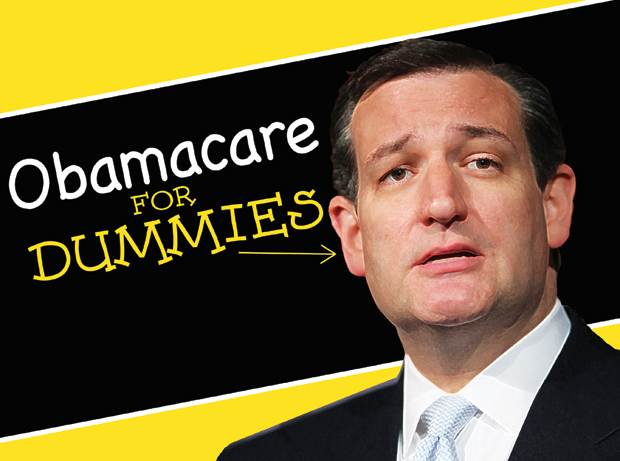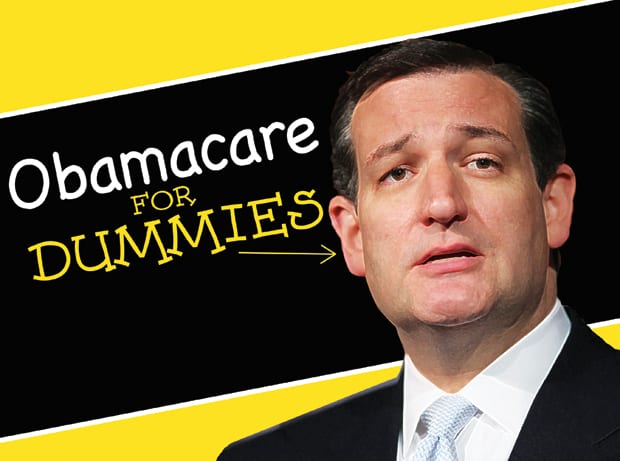Pre-existing conditions, gender identity or where you live are no longer reasons to deny insurance coverage

I DO NOT LIKE HEALTHCARE | Sen. Ted Cruz has led the GOP in attacking the Affordable Care Act. In 2013, he railed for 21 hours on the Senate floor against the ACT, including references to Dr. Seuss and Star Wars. (Illustration by Kevin Thomas)
David Richardson remembers a time when Oak Lawn’s 75219 zip code was redlined for insurance coverage. The AIDS crisis was in full swing, and although neither he nor any of his Cedar Springs Road stores’ office or retail staff had pre-existing conditions at the time, their insurance rates suddenly skyrocketed.
To get around the problem, Richardson asked for new bids, but he used the address for a warehouse he had on Manufacturing Street behind the Anatole Hotel. Its zip code was different than the Oak Lawn one. It made a difference.
“The rates went down by at least half,” Richardson said. “That’s because we were no longer in the gay area.”
The Affordable Care Act, commonly called ObamaCare, which went into effect in January prevents that sort of discrimination by insurance companies. Pre-existing conditions can no longer be used to hike up rates and neighborhoods can’t be redlined.
The new healthcare law makes policies affordable to more people by subsidizing insurance for some and expanding Medicaid coverage in states that agreed to that expansion. However, in Texas, the state with the most uninsured people, Gov. Rick Perry did not expand Medicare coverage.
According to a new report released by the U.S. Census Bureau, out of the 435 U.S. congressional districts, Rep. Marc Veasey’s district ranks on top as the one with the most uninsured people. His District 33 had 271,443 uninsured residents. That’s 38.4 percent of his constituents in a district that runs from North Oak Cliff to Southeast Fort Worth.
Compare that to Rep. Joseph Kennedy’s Massachusetts district that ranks on the other extreme with only 2.8 percent of his constituents uninsured.
While Veasey’s district ranked highest on the nation’s uninsured list, the rest of the Metroplex did, too.
Rep. Eddie Bernice Johnson’s Dallas district ranked 14th nationally with 203,558 people or 29.8 percent of her district without health insurance. Four other Texas congressional districts rank between Johnson’s and Veasey’s in number of uninsured.
Even Rep. Pete Sessions’ wealthier North Dallas district that includes Highland Park had 151,788 uninsured residents, or 21.4 percent of his district, and 14 percent of Rep. Sam Johnson’s Plano district reported they were uninsured.
As bad as the health coverage rate is in Texas, it gets worse. According to a study by the Department of Health and Human Services, the LGBT community tends to be covered at an even lower rate. Because of that, HHS Secretary Kathleen Sebelius said the Obama administration targeted states such as Texas to get people signed up for insurance under the healthcare marketplace. A breakdown of how many newly insured people by district is not available yet.
On a recent visit to Dallas, Sebelius said five million people remain uninsured in Texas who would have been eligible for coverage had Texas expanded Medicaid.
“That’s an $18 million per day loss in Texas,” Sebelius said.
In addition to covering more people, the ACA benefits the LGBT community specifically in a number of ways, according to the HHS.
No one can be denied coverage because of his or her sexual orientation or gender identity, and no one can be charged higher premiums because of it.
When purchasing insurance through the Marketplace, all legally married couples are treated the same for financial assistance, whether or not they live in a marriage equality state.
Being transgender may no longer be considered a pre-existing condition, either.
“I was one of the ones who applied for individual coverage and was told I was not qualified,” trans activist Nell Gaither said.
Instead, when she left her job, she had to take the more expensive COBRA policy offered.
She gave several examples of how trans people were denied coverage in the past.
If a transman had top surgery, some breast tissue would be left. If he developed breast cancer, coverage would have been denied. Had internal organs not been removed, a transman might develop ovarian cancer that was denied for a policy covering a man. A trans woman who developed prostate cancer also was denied coverage.
Gaither said she’s heard that loopholes remain, but the law requires full coverage for everyone. She’s hopeful any remaining problems with coverage will be resolved.
Insurance policies may no longer have lifetime limits, which benefits some people with HIV, especially those who have had cancer or other opportunistic infections that required expensive treatment and care.
American Healthcare Foundation Texas Regional Director Bret Camp said, “People with HIV will live longer, so many more would have reached the cap.”
A number of new policies set by executive order or made by HHS benefit the LGBT community.
As the Healthcare.gov website is upgraded, an online tool will be added to identify policies that cover domestic partners.
One of the most far-reaching is the Presidential Memorandum on Hospital Visitation. That order ensured that hospitals receiving Medicare or Medicaid funding would respect the rights of patients to designate visitors, regardless of sexual orientation.
So far, the effects of the ACA on the LGBT community are difficult to measure, officials say.
John Carlo, executive director of AIDS Arms, said just a couple of his agency’s patients have gained coverage.
“More people are coming into care, so ultimately this is a good thing,” Carlo said.
Many of AIDS Arms’ patients could gain coverage through Medicaid expansion, but Texas isn’t participating in that program. Even if Texas did expand Medicaid coverage, it would have limited effect in getting people into care since so many doctors refuse to accept Medicaid, Carlo pointed out.
In Dallas, some people with HIV have maintained insurance through a program run by Resource Center and funded with Ryan White money.
In Louisiana, Blue Cross decided it would not accept Ryan White money as payment for its policies.
“They don’t want people with HIV on their plans,” Carlo said.
Carlo also is concerned that mindset will spread to Texas, and some people with HIV would lose their coverage.
When Sebelius was in Dallas in January to discuss the rollout of the ACA, she said as coverage kicks in and more and more people have basic medical care covered, programs like Ryan White may be affected.
“It’s a discussion Congress will have,” she said. “In Massachusetts, their Ryan White money is used for housing and drug support.”
There was a reduction in the amount spent on general health care, she said.
“We’ll get to a day when the money spent will go to research,” she said.
As the ACA is implemented, Sebelius says the HHS plans to pay close attention to the health needs of the LGBT community and include LGBT health experts on a variety of advisory boards.
This article appeared in the Dallas Voice print edition February 28, 2014.














